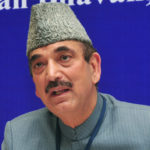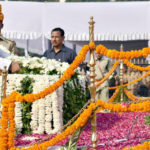The National Human Rights Commission has always considered media as its equal partner in the promotion and protection of human rights. The media has immensely helped in building awareness about human rights and the role of the NHRC. Media reports have been the basis of several suo motu cognizance that the Commission took about the violations of human rights in the far flung areas of the country, which, otherwise, may not have come to the notice of the Commission. Therefore, it is our obvious pleasure to have media persons on board while celebrating the Foundation Day of the NHRC.
The Commission was set up to look into the issues of human rights violations of all and not just of those whom some people might choose as vulnerable. Since the 12th October, 1993, the day of its foundation, the NHRC has come a long way by addressing several issues of human rights violations as well as giving inputs on key legislations impacting human rights. Whenever an issue of human rights violation comes to the notice of the NHRC, it has to take its cognizance without bothering for the permutation and combinations of electoral politics or caste and creed equations.
Over more than a lakh complaints being received in the Commission, indicates not only the increasing faith of the people in its functioning but also their awareness about the importance of promotion and protection of human rights. Since October, 2015 to September, 2016, the NHRC has registered 1,05,664 cases on the basis of complaints, intimation from Police and Prison authorities etc and on suo motu basis. The number of cases registered during the period on suo motu basis is 133. During the corresponding period in 2014-15 and 2013-14, it registered 1,17,477 and 1,06,684 cases respectively.
The onus is on governments in States and Centre to ensure that the faith of the people in the NHRC is not shaken even by exception, when some of them choose to ignore its recommendations, not on the merits but merely on the ground that they are not bound under the Protection of Human Rights Act to accept them.
The faith also becomes a reason for enhanced expectations. The NHRC has not been an exception to this. Out of several complaints received in the Commission, many are on the issues, which are beyond its jurisdiction. The Commission can take cognizance of complaints only against the action or inaction of a public authority and not a private authority. Also, civil and property disputes as well as service matters, except the pension and family pension issues, are beyond the Commission’s jurisdiction. It cannot take cognizance of an incident of human rights violation, if it is reported a year after its occurrence.
Since October, 2015 to September, 2016, the Commission has disposed 1,11,295 cases out of which 59,924 had to be dismissed in limini, as these were not in line with the provisions of the protection of the PHR Act. During the period, the Commission recommended monetary relief to the tune of Rs. 70, 93,000 in 380 cases. The public authorities complying with the Commission’s recommendations paid Rs. 11,59,56,172 as monetary relief in 410 cases to the victims or their kin. These included cases of the previous year as well as the some cases wherein recommendations were made during 2015-2016.
During the period, maximum 32,498 complaints were registered against police, out of which 206 cases were of encounter. Chhattisgarh with 66 encounter cases, topped the list followed by 43 in Assam, 15 in Jharkhand, 10 in Odisha, 7 each in Maharashtra and Meghalaya, 5 each in Uttar Pradesh and Manipur. West Bengal with 11 cases, topped the list of registered cases of encounter by Para-Military forces. Uttar Pradesh with 401 cases topped the list of cases of deaths in judicial custody as well as in the list of cases of deaths in police custody with 27 cases.
During the period, apart from holding various seminars, workshops on issues of human rights violation, the Commission also held 2 camp sittings and open hearings in Bihar and Jharkhand. It also held extensive consultations with different stakeholders to assess the prevailing human rights situation in the country. An independent report was prepared and sent to the UN mandated Human Rights Council for the 3rd Universal Periodic Review, UPR.
The Commission has the mandate to question governments on allegations of the negligence in the prevention of violation of human rights and guide them in their commitment towards good governance. Therefore, the cases registered by the Commission, raise direct or indirect questions on the functioning of the governments.
However, its interventions are not adversarial to the functioning of the governments as ultimately the aim of both of them is to work towards the promotion and protection of human rights through good governance.
NHRC Chairperson, Hon’ble Justice H.L. Dattu’s statement to media

Leave a comment




